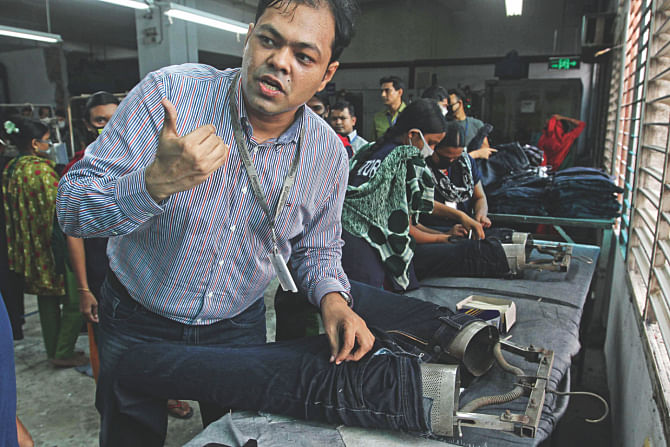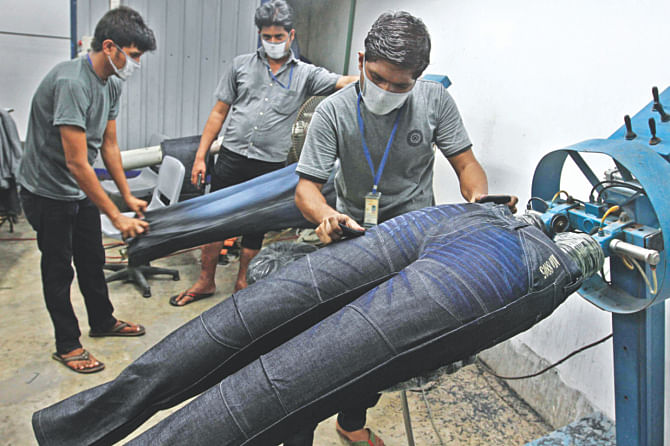A denim expert indeed

Collecting denim trousers is his hobby, leading to an astounding assortment of 12,000 designs at his denim studio at the factory in Karnaphuli Export Processing Zone in Chittagong.
“I am a designer of denim products myself, and I do not copy and paste other's designs,” said Mostafiz Uddin, managing director of Denim Expert Ltd, in an interview with The Daily Star recently.
In Bangladesh, garment makers usually manufacture the items with designs supplied by the international retailers, but in his case, he does not depend on the designs provided.
“I have a big design studio and I spend a lot of time and effort to produce new designs.”
Sixty percent of his products are sold under his own brand name, BlueXonly, in different boutiques in the Netherlands, Belgium, Hungary and Italy. At present, he makes jeans for both men and women.

The remaining 40 percent of the products are sold to different European retailers like Primark, Tesco and New Yorker.
The company also has its own warehouse in the Netherlands, from where the trousers are distributed to different boutiques in Europe.
Denim Expert currently produces 12,000 pieces of trousers a day, with a workforce of nearly 2,000, Mostafiz said.
The company exports denim products worth $24 million a year, with an 18 percent growth last year.
“I have set up an independent business plan to avoid the hassle of middlemen. I sell my products directly to my customers.” Typically, most Bangladeshi garment makers sell their products through vendors or buying houses.
The young entrepreneur started his business in 1999 by shipping denim trousers worth $12,000 to Europe.
“Now, I have work orders worth millions of dollars in my hand as retailers have confidence on my products and designs.”
“My next target is to increase daily production to 50,000 pieces over the next three to five years,” he said.
He plans to extend the current two-storey factory building to eight storeys to increase production and meet growing demand from retailers. Each floor of the building spans 74,000 square feet.
Mostafiz said he uses only high quality fabrics to stitch jeans as he caters to upscale customers, but he did not mention the price range of the products. He pays wages higher than the minimum level recommended by the wage board.
On sustainability of business, Mostafiz said he recycles 61 cubic metres of water from the dyeing and the washing plants per hour and reuses the water for various purposes.
He also uses the recycled water for fish farming in a pond in front of the factory building. “I use the fish in the pond as a yardstick to check the quality of recycled water. So far, no fish died and I am happy.”
The company uses rain water for 90 days a year as it has a large water reservoir with a capacity of 32 million gallons; the stored water is used for dyeing and washing of the denim products, he said.
“I also reuse the steam from the boilers for different purposes.” Such practices can help save a lot of money in a year, he added.
The Accord, a European platform of 189 retailers and brands for the inspection of garment factories, identified Denim Expert as a green building upon inspecting building, fire and safety standards recently.
In addition, Mostafiz washes 10 pieces of trousers himself every time he visits his factory. At the end of the year, these pieces are sold in the local market and the proceeds are donated to orphans.
However, it was not all smooth sailing for the entrepreneur; early in his career, he faced several hurdles in establishing the business.
After completing his BBA and MBA from Madras University in India in 1998, he joined as a trainee officer with a monthly salary of $30 in a small foreign garment buying house in Chittagong.
In a short one year, he was promoted to executive director of the company but he had bigger plans for himself.
“I resigned from my job and was determined to be a businessman in the garment sector.
I started trading in garments and soon, I found a Dutch partner to whom I proposed to set up a garment factory under a joint venture in Bangladesh,” he said.
The Dutch businessman agreed to his proposal and set up the denim factory in Chittagong, marking the start of his journey as an entrepreneur.
“I have a dream to set up a denim university in Bangladesh in near future, as denim is the next big global business for changing fashion and styles.”
Bangladesh's share in the global $60 billion denim market is still insignificant at $600 million. “We have a lot of scope to earn more from the export of denim garment products.”
To materialise his dream of making Bangladesh a major denim maker, Mostafiz took an initiative to host the country's first international exhibition of denim products in March 2014.
With the positive response from retailers, the second edition of the show was hosted in November 2014 in Dhaka. Companies from Germany, the US, Italy, the Netherlands, Turkey, Japan, India, Pakistan, Sri Lanka, Brazil and Thailand participated in the fair.
Bangladesh has 25 denim factories that produce around 20 million yards of denim fabrics a month. Total investment in the sub-sector stands at Tk 6,500 crore.
Bangladeshi denim fabric makers meet 40 percent of the local demand placed by exporters; imports account for the rest.
Bangladeshi entrepreneurs supply denim products to major retailers and brands, including H&M, Uniqlo, Levis, Nike, Tesco, Wrangler, s.Oliver, Hugo Boss, Puma, Primark, JC Penney, C&A, Tommy Hilfiger, Inditex, Walmart, M&S, Calvin Klein, Diesel, Gap, Channel, Dior and G-Star.

 For all latest news, follow The Daily Star's Google News channel.
For all latest news, follow The Daily Star's Google News channel. 



Comments